Behind every successful mobile application, there is a well-organized team. Skilled professionals coordinate their work to deliver an accessible, appealing, and convenient solution.
As mobile apps face severe competition today, you need a reliable team that will handle tasks in the development process.
Based on years of experience, we share our knowledge of composing a mobile app development team. Understanding who is involved in the process will give you a better understanding of the key aspects and costs of developing your app.
Let’s see how to build your stellar development crew in more detail.
How to create a productive mobile app development team
Once you've determined the value and functionality of your mobile application, you will need a team to bring it to life. And the better you organize the team's work, the more cost-effective development will be.
To help you choose the right mobile app development team, we suggest the following tips:
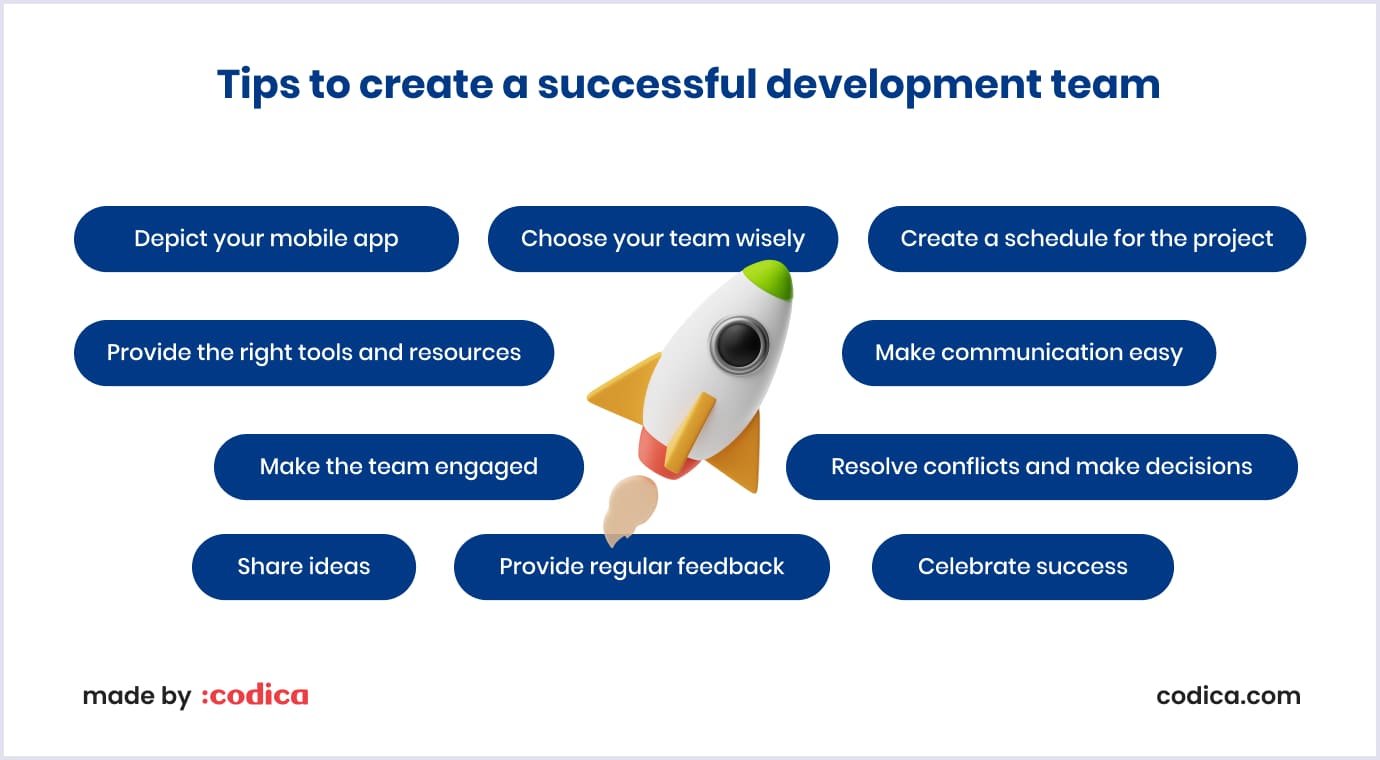
Depict your mobile app. With a clear vision of your mobile product, you can communicate it to the team. You will make sure the team knows what they need to do and what you expect.
Choose your team wisely. When choosing professionals or a technical partner, look at their experience, past projects, and communication skills. Make sure the team works well together and keeps you updated.
Create a schedule for the project. Set deadlines for each task and stage for each team member.
Provide the right tools and resources. Ensure your team uses up-to-date software and hardware to deliver the best results. Arrange the necessary support and training for them.
Make communication easy. Good communication helps teams work faster. Meetings, video calls, and online messaging keep the team in sync.
Share ideas. Let team members share ideas and solve problems. Promote efficiency and collaboration.
Make them engaged and eager to fulfill tasks. Make sure the app developers are committed to the project. Thank them for their work and give them rewards.
Resolve conflicts and make decisions. Resolve conflicts and make decisions. Plan how to resolve team conflicts. Help the team solve disagreements and reach a consensus.
Provide regular feedback. Praise the team for what they do well and give constructive criticism when needed. This helps them understand what they are doing well and how they can improve.
Celebrate success. Cherishing accomplishments and celebrating milestones will encourage your team to do their best in the future. Personalized awards, thank-you cards, and team-building activities can show that you appreciate the team’s work.

Who is involved in mobile app development?
A mobile app development team is made up of different people, and it's important to know who's involved in the process.
The team is formed depending on the project specification in each case. Still, there are basic roles that ensure successful project implementation. What is the ideal development team for mobile app development? It is as follows:
- Project manager;
- Product manager;
- UI/UX designer;
- iOS/Android/cross-platform developer (depending on the project scope);
- Backend developer;
- Quality assurance engineer;
- DevOps engineer.
Let’s discuss them and their responsibilities in the development process in more detail.
1. Project manager: responsibilities and skills
When you bring a company on board to work on a project, you'll have a project manager to help you out. The project manager is the one who oversees the project from start to finish and makes sure the team knows what's needed.
The project manager is your go-between throughout the development process, ensuring smooth communication between you as a client and the team as a contractor.
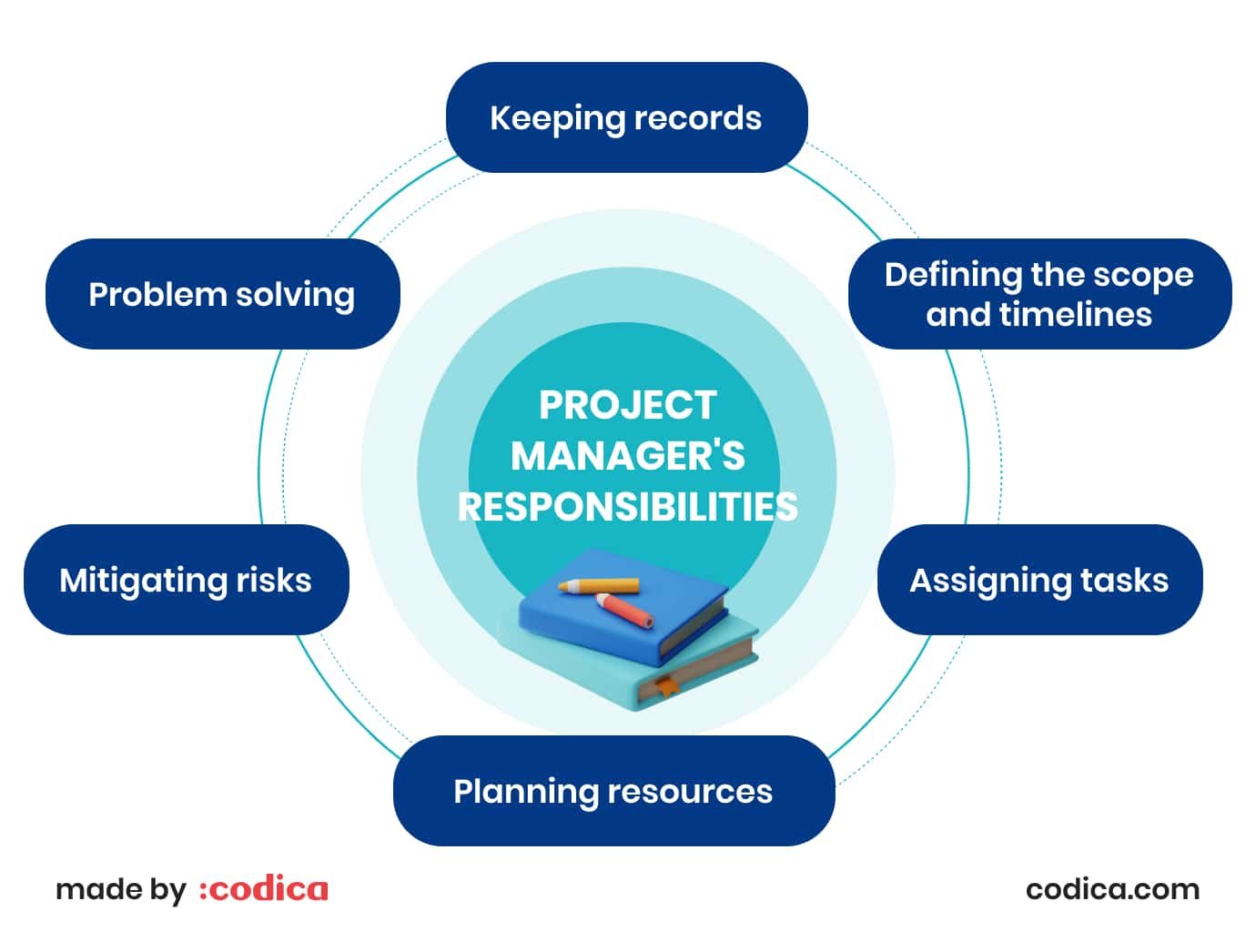
The project manager’s responsibilities include:
- Setting the scope, goals and timelines;
- Delegating tasks to the right people and keeping everyone in the loop;
- Planning resources, managing costs and staying within budget;
- Spotting potential risks and dealing with them;
- Keeping stakeholders and team members up to date and running meetings;
- Ensuring high standards of development;
- Lending a hand with any issues the development team faces;
- Keeping records so everyone can check the latest info.
Project managers need to have certain skills to do their job well:
- Analytical, communication, leadership, technical, strategic and customer focused skills;
- Applying project management methodologies, such as waterfall or agile, including Kanban and - Scrum varieties;
- Strong experience with project management tools, such as Asana and Confluence.
Further reading: How to Get Your Team to Estimate Better in 3 Simple Steps
2. Product manager: responsibilities and skills
This specialist is mistakenly equated to a project manager, but they differ. The project manager coordinates the project, which is a process with steps and deadlines. Meanwhile, the product manager oversees the product. It starts with the idea and continues until the product is deployed, which is unlimited as customers constantly use the product.
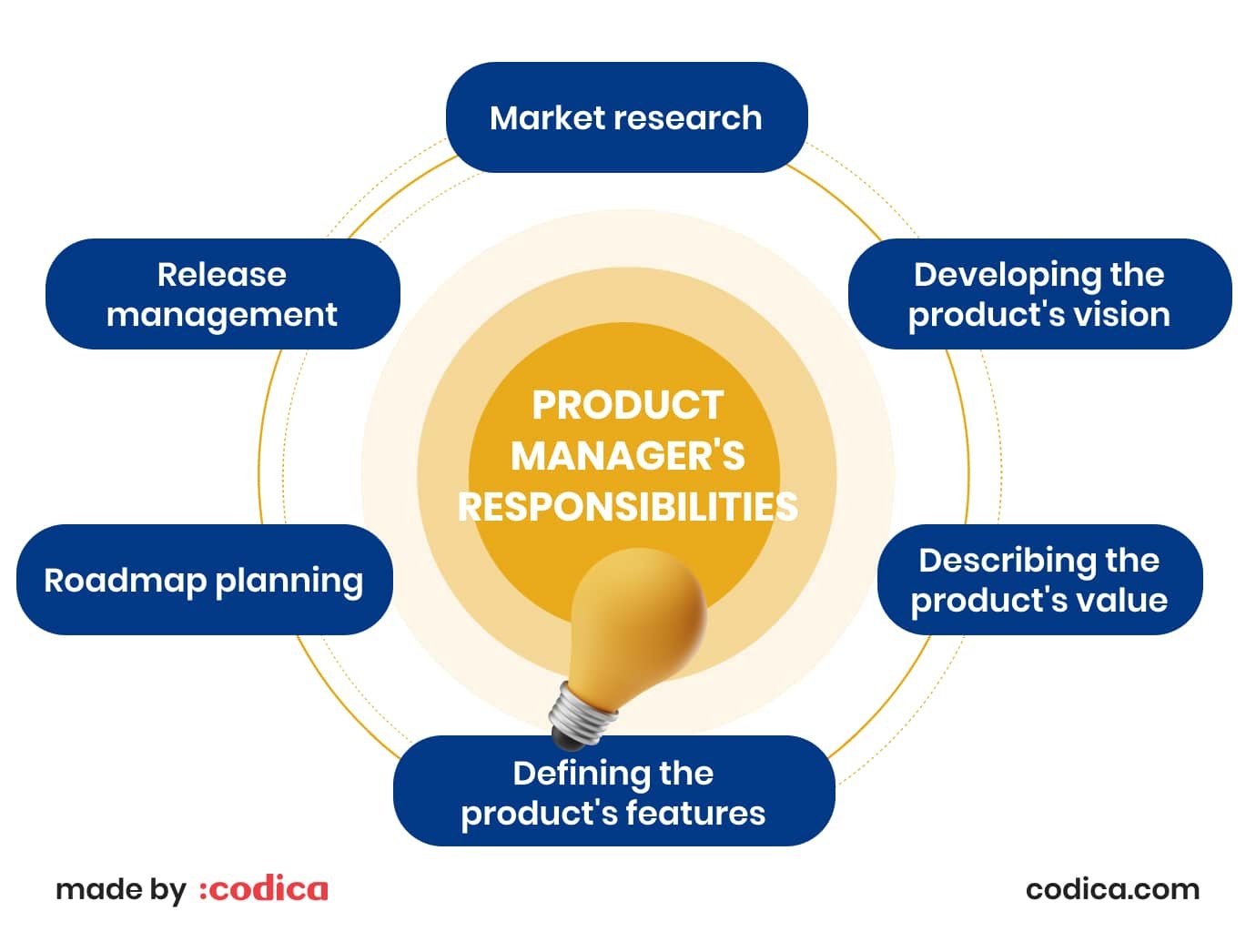
The product manager’s responsibilities include:
- Analyzing market trends, customers’ needs, and competitor apps;
- Outlining the product’s goals and long-term development;
- Describing unique value proposition, benefits, and features by priority;
- Creating a business plan for app development;
- Gathering requirements to keep stakeholders and the development team informed;
- Managing product releases to make sure everything works correctly.
A product manager should have the same skills as a project manager. In addition, a product manager uses analytics tools such as Google Analytics, Firebase, Adobe Analytics, Mixpanel, and Pendo.
Project manager vs. product manager
It's always a good idea to have a project manager and a product manager for complex projects. If the app is simple, the project manager can take on the product manager's responsibilities. This way, you have one person managing the project and product aspects.
Here's a quick comparison of the two roles:
| Project manager’s responsibilities | Product manager’s responsibilities |
| Provide project scope | Provide product vision and strategy |
| Analyze competition and market trends | Analyze features and product-market fit |
| Ensure teamwork and meeting timelines | Guide teams toward the product vision |
| Mitigate risks to keep the project on track | Assess market risks for the product |
| Keep the project within budget and time limits | Work on market adoption, user satisfaction, and revenue growth |
3. UI/UX designers: responsibilities and skills
These professionals create the app’s visual part. Designers are involved in every step of the app development process, starting with discussing the app with the client. They perform product research and analyze the features to be included in the product.
Based on this information, designers create user flow and choose the color palette and typography. UI/UX designers ensure the product will be convenient and appealing to users.
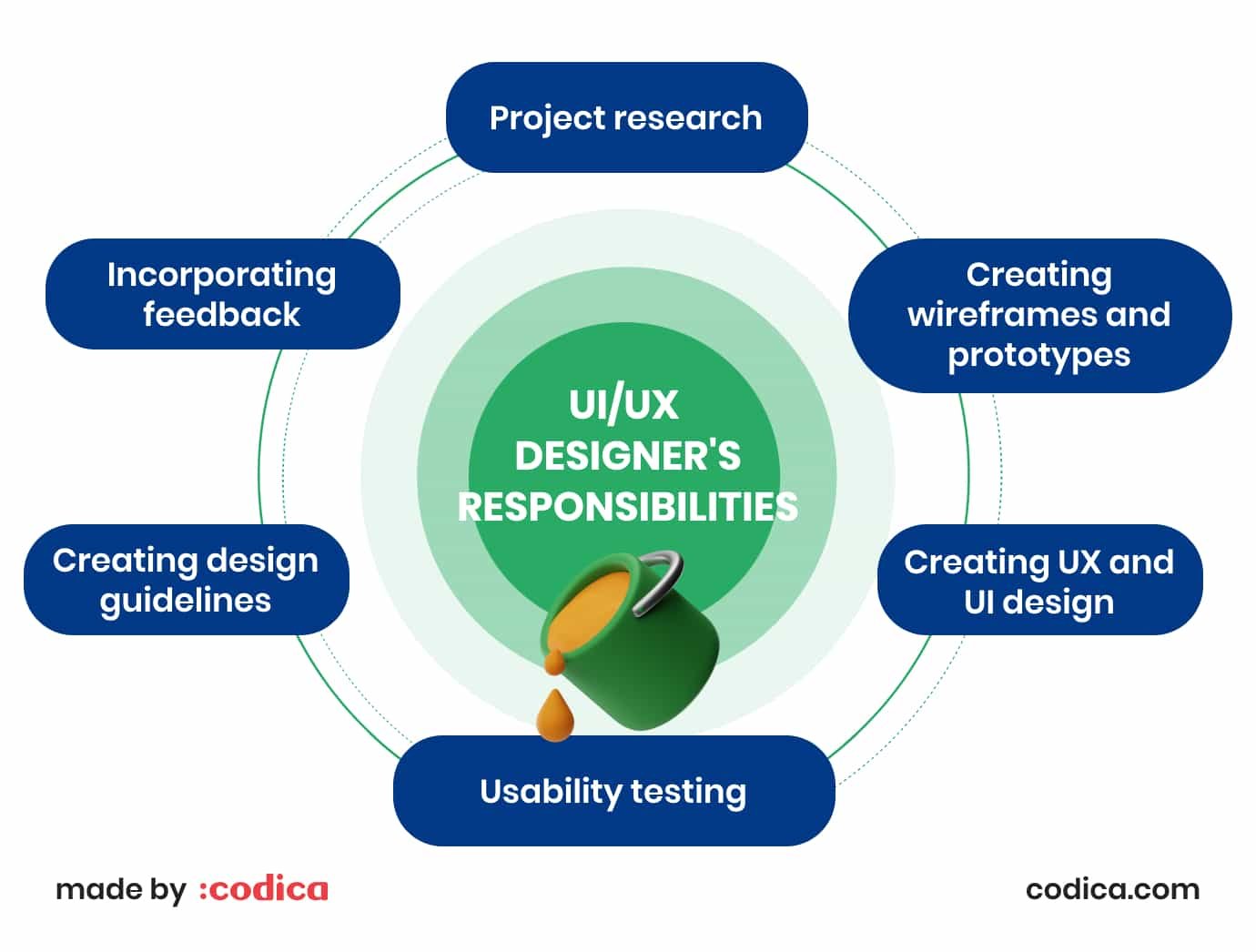
That's the designer's responsibility:
- Study the project requirements, such as objectives, target audience, and features;
- Create wireframes and prototypes outlining the app’s look with roles and flow;
- Create design documentation that developers and quality assurance engineers can use;
- Discuss the design with the development team and client;
- Make corrections along the development process based on feedback from developers, clients, and users.
Regarding these responsibilities, designers should have the following skills to deliver the best results:
- Expertise working with design tools, such as Figma, Balsamiq, Sketch, or other similar technologies;
- Knowledge of the best practices in wireframing, prototyping, user experience (UX), and user interface (UI) designing;
- Basic familiarity with coding to align design vision with developers.
Read also: Progressive Web App Design: 9 Tips for Great PWA UX and UI
4. Developers: responsibilities and skills
Development includes the creation of native and cross-platform mobile solutions. Native mobile apps are developed for specific operating systems, namely iOS and Android. Meanwhile, cross-platform apps work on different platforms.
Depending on the scope and budget of your mobile app, you can hire specific engineers. They can be experts in developing solutions for particular platforms or in creating cross-platform apps.
Mobile solutions embrace frontend and backend parts. So, let’s see in more detail which duties and skills your mobile app engineers should have for frontend and backend development.
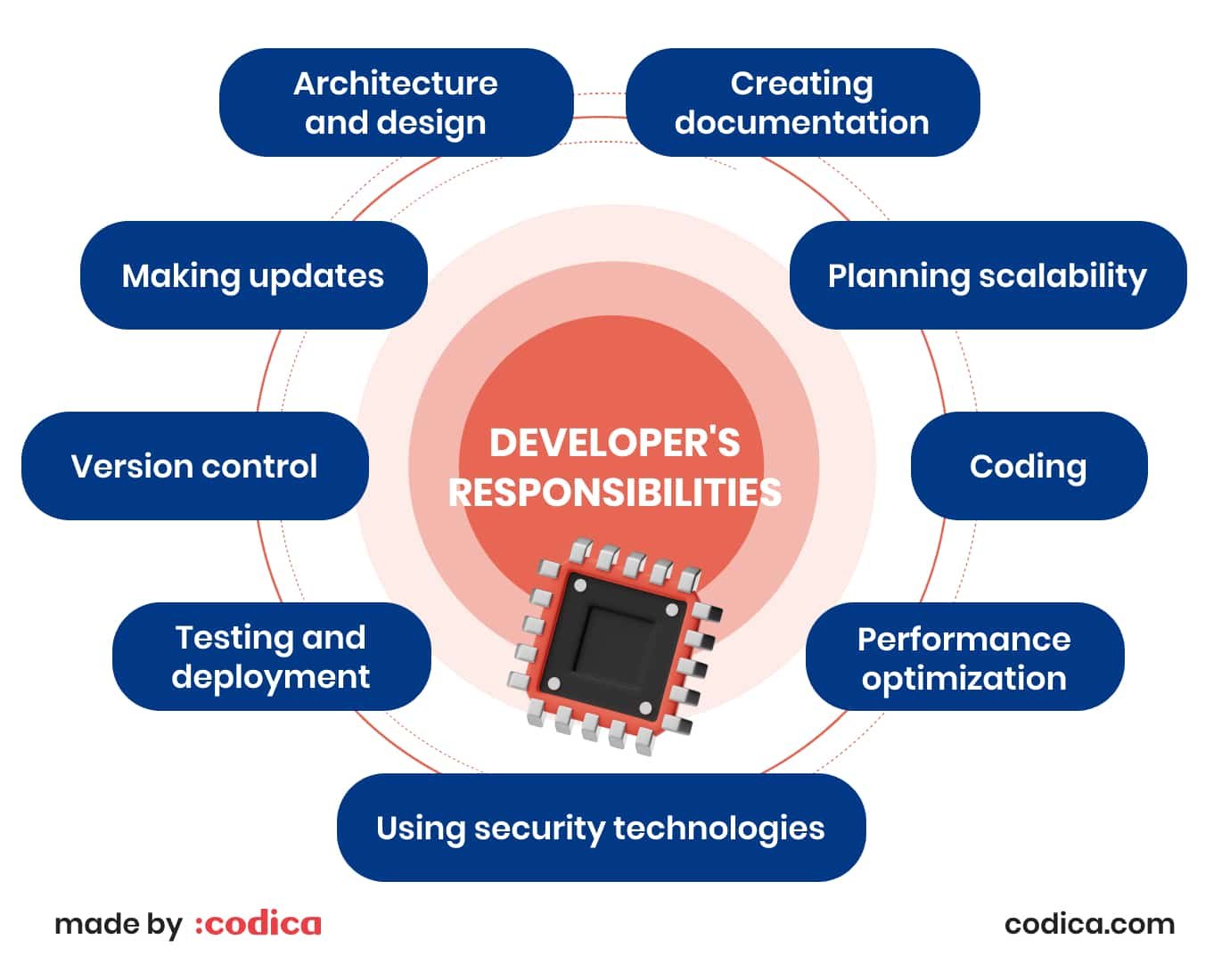
The developer’s responsibilities include the following:
- Creating the app’s technical architecture based on the design and requirements;
- Converting prototypes into well-structured code for the best app performance;
- Including changes to the app code as per users’ and clients’ feedback;
- Using security technologies for the app;
- Writing and running development tests to ensure the app’s proper work;
- Creating documentation for other team members and future reference;
- Planning the app structure scalability for future growth;
- Deploying code to the production environment and conducting integration testing;
- Making updates as required using the latest versions of languages and frameworks.
To ensure that your mobile app meets the best standards, the developers should have the proper experience in mobile app development technologies. Let’s see what qualifications developers should have.
iOS developers’ skills:
- In-depth knowledge of Swift and Objective-C, helping build new and maintain existing apps;
- Experience with IDEs (integrated development environments) and SDKs (software development kits), such as Apple Xcode, AppCode, and iOS SDK;
- Using SwiftUI and UIKit for interactive elements;
- Understanding the best practices for a few generations of iOS and iPadOS;
- Knowledge of collaboration tools for working within an iOS development team.
Android developers’ skills:
- Expertise with Android development languages, namely Kotlin and Java;
- Hands-on with Android Studio as a development environment and Android SDK as a set of useful features;
- Mastery of developing different app versions for various devices and screen sizes;
- Knowledge of collaboration tools for working within an Android development team.
Cross-platform developers’ skills:
- Mastery of cross-platform frameworks, namely React Native, Flutter, and Xamarin, which are based on JavaScript, Dart, and C# languages, respectively;
- Experience with developing cross-platform apps with mobile-first designs suitable for different devices;
- Knowledge of collaboration tools for working within a cross-platform app development team.
Backend developers’ skills:
- Strong understanding of backend programming languages and frameworks, such as Ruby, Ruby on Rails, Node.js, Strapi, and Nest.js;
- Using version control systems like Git;
- Experience in creating APIs (application programming interfaces) to ensure that an app sends and receives data from the server;
- Knowledge of collaboration tools for working within a mobile apps development team.
You may also like: Flutter vs. React Native: What to Choose for Your App Development
5. QA engineers: responsibilities and skills
Why is a quality assurance tester needed on a software development team? Quality assurance engineers monitor every stage of app development. Thus, they ensure the design and mobile app align with requirements and do not contain errors. Careful testing of the app means that it will work properly. As a result of quality assurance services, the client receives a bug-free mobile solution on time and within budget.
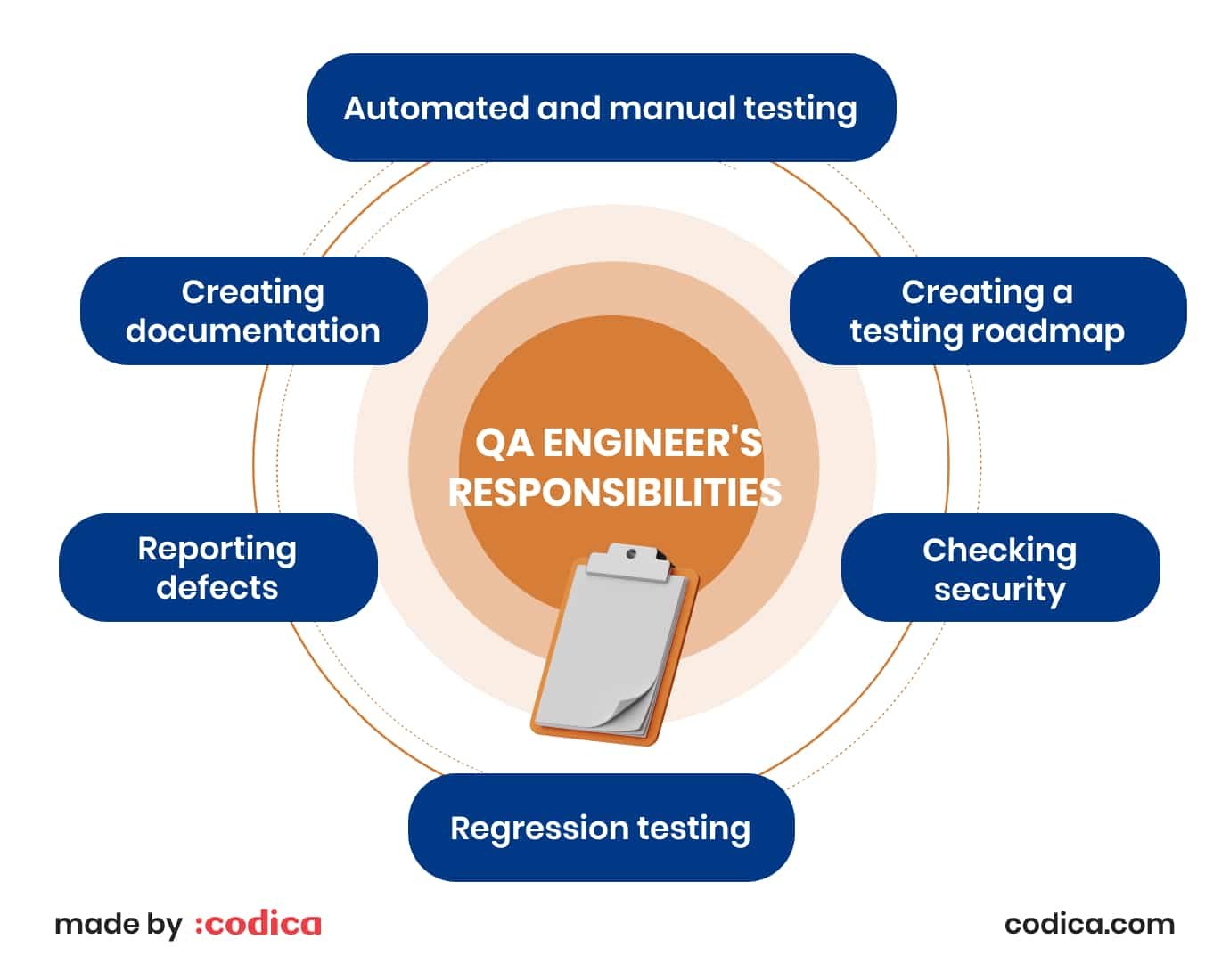
The tester’s responsibilities include the following:
- Creating a roadmap for manual and automated testing with testing scope, objectives, and strategies;
- Testing functionality, usability, and performance;
- Checking the app for security vulnerabilities;
- Performing regression testing after changes were introduced;
- Reporting defects;
- Creating documentation with test results for future reference.
Regarding these duties, QA engineers should possess specific skills, which are as follows:
- Expertise in using testing tools, such as Appium, Selenium, TestComplete, and Avo Assure;
- Hands-on with bug tracking tools, like Jira and Bugzilla;
- Understanding how to create manual and automated tests with specific testing metrics.
6. DevOps engineers: responsibilities and skills
The processes involved while the app is under development, deployment, and maintenance should be efficient. So, the entire process moves quickly and requires less cost. That is why the software development team structure embraces DevOps engineers. They ensure the processes are optimized and the app’s work is smooth.
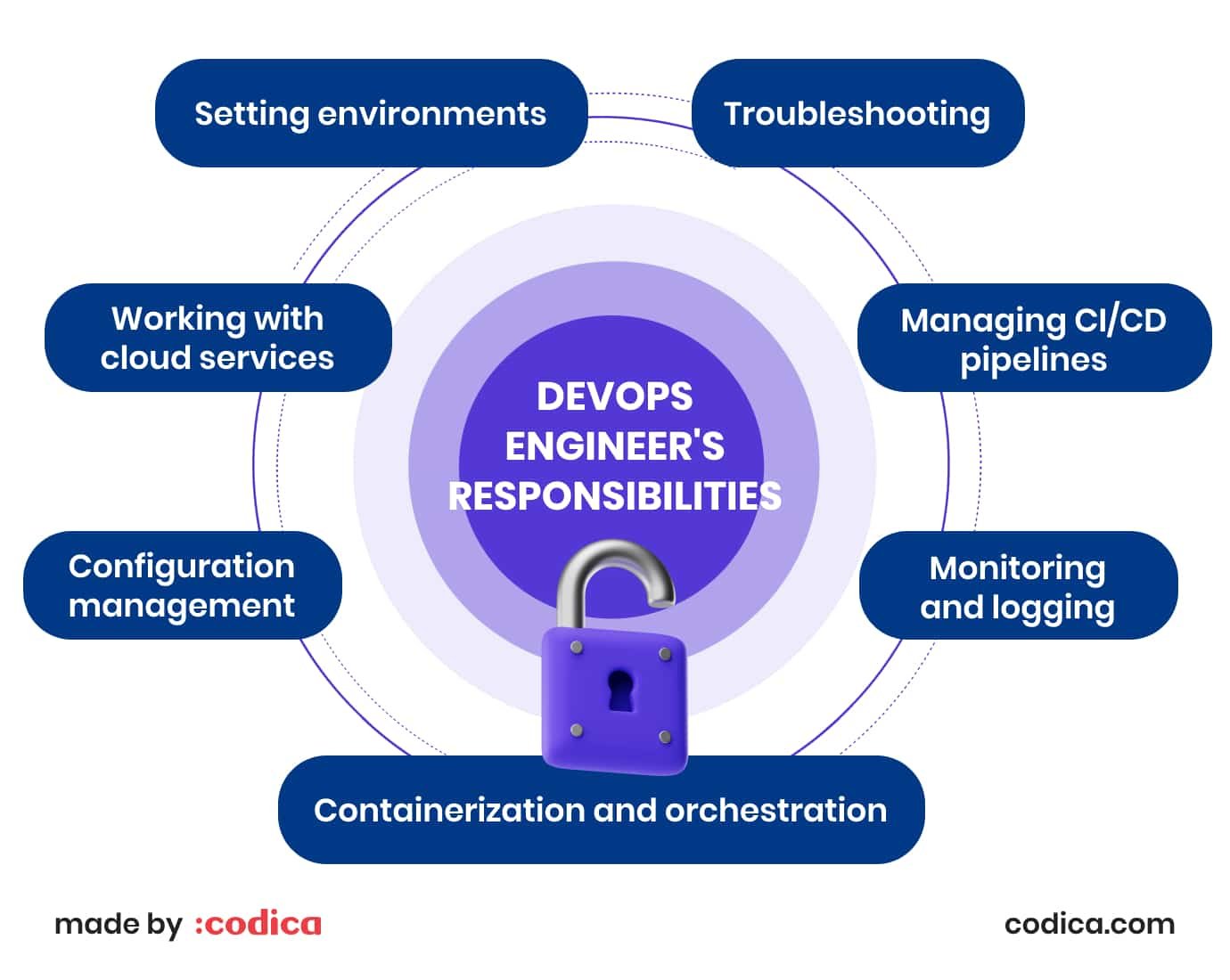
DevOps engineers’ responsibilities include the following:
- Automating repetitive tasks and processes with scripts and DevOps tools;
- Setting up and maintaining CI/CD pipelines (continuous integration/continuous delivery) to automate building, testing, and deploying code changes;
- Defining and managing infrastructure;
- Packing, deploying, and managing apps with containers;
- Analyzing and preventing issues in a production environment to reduce downtime.
With the above tasks, DevOps engineers should have the following skills:
- Strong experience with tools for automating and configuring processes, such as Terraform, Ansible, Docker, Amazon Web Services, and more;
- Strong experience in configuring, automating, and monitoring software processes.
Related reading: AWS vs. Microsoft Azure vs. Google Cloud Services Comparison
5 stages of app development and team roles
Mobile app development is a versatile process involving different specialists from the start to the lifetime support. Below, we split the mobile app development process into five main stages and specify which roles are essential in each of them.
Stage 1: Product discovery
At this stage, the team helps you validate your idea, create specifications, estimate the budget and timeline, and understand the team size and composition. The image below gives a grasp of the main tasks of the product discovery stage.
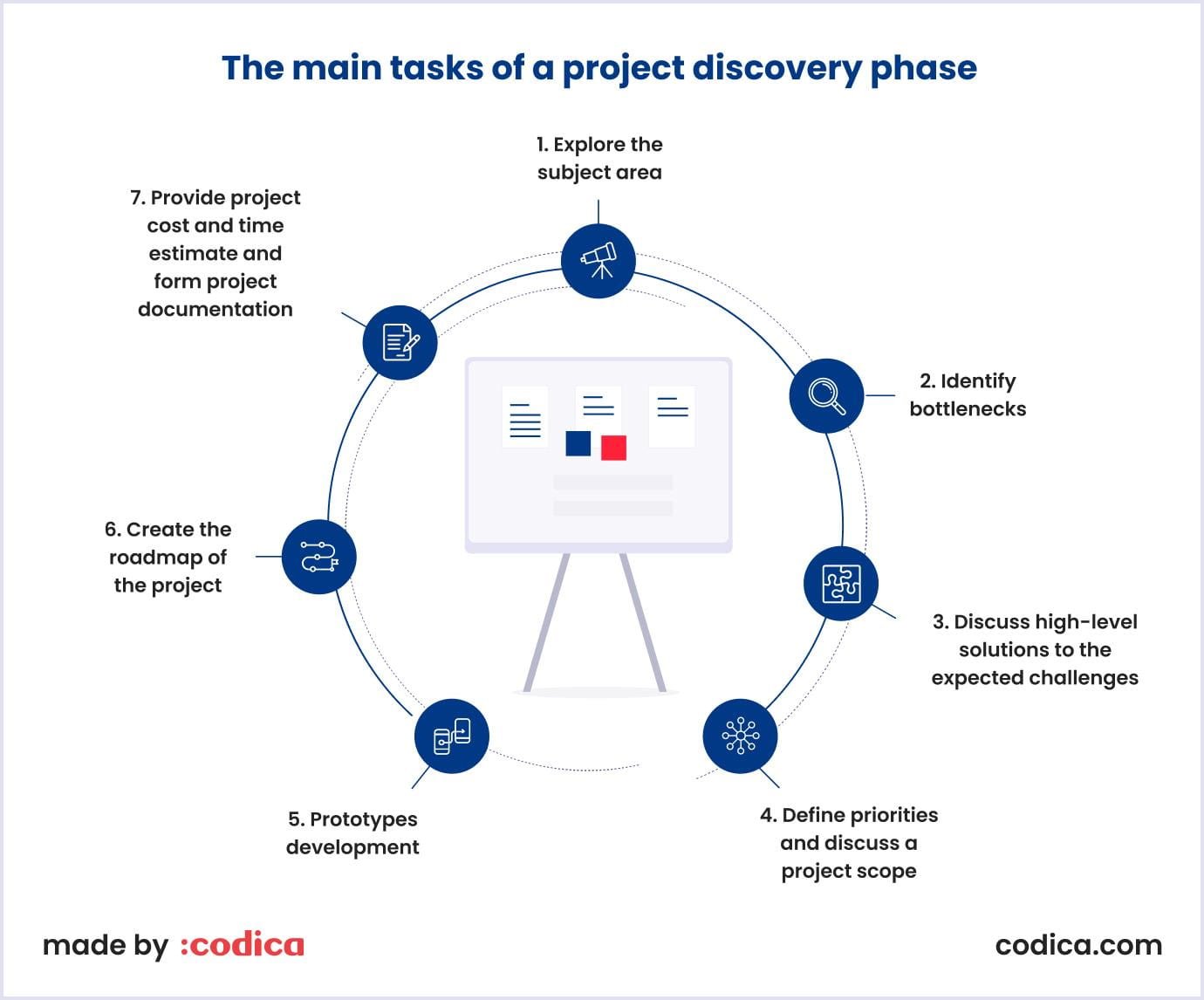
At this stage, you need the following specialists:
- Project manager who communicates with you and the team members;
- UI/UX designer who creates prototypes to give an app’s basic visualization;
- Lead developer who understands the app’s architecture and technical requirements.
Stage 2: UI/UX design
When the stakeholders and the team have agreed on the app requirements, designers proceed from prototypes to the complete visualization of the app. Designers include interface details and create flow for each app step and role.
The following specialists take part in this stage:
- Project manager who manages communication between the client and team members;
- UI/UX designer who visualizes the app and creates a guide to be used by other team members;
- iOS/Android/cross-platform and backend developers who study how the functionality should be implemented.
You may also like: What Should Every Startup Know About the App Design Process
Stage 3: Development
This stage starts with the inception phase when the project team discusses the product requirements and vision. The team analyzes requirements from the client and the design visualization. Based on these data, the development team builds the solution.
The specialists taking part in this stage are as follows:
- Project manager managing team communication and setting tasks for the development team;
- iOS/Android/cross-platform and backend developers who build and test the code;
- DevOps engineer who sets the staging environment and deploys the code via Amazon Web Services.
Read also: Gamification in Mobile Apps: Bright Examples to Inspire
Stage 4: Testing
Quality assurance is a step when testers check the app for bugs and errors. They also check if the solution is built per requirements, vision, and design. The whole team is involved in this process to ensure the mobile app works appropriately and per requirements.
The professionals taking part in this stage are as follows:
- Project manager checking the tasks for team members and coordinating the work;
- DevOps engineer creating testing environment;
- QA engineers performing tests and giving feedback to the team and client;
- iOS/Android/cross-platform and backend developers making adjustments to the code if needed;
- UI/UX designer making changes to the design if necessary.
Stage 5: Maintenance and support
Once developed, the mobile app is released to users. The team that has worked on the mobile app maintains its stable and continuous work. So, at this stage, the relevant specialists will help you support and enhance your app based on users’ feedback and market needs.
Depending on the elements that need to be changed or enhanced, you can contact the project leader, UI/UX developer, developer, DevOps technician, or QA professionals.
Choosing the size of your app development team
When considering the mobile app development team, you should make estimates first. The following are the aspects to consider when defining the team size:
- Chosen app platforms: iOS, Android, both, or cross-platform;
- Scope and complexity of features to be implemented;
- Experience and expertise of the specialists to be involved;
- Timelines;
- Available budget.
The typical development team will include a project manager, UI/UX designer, iOS/Android/cross-platform developer, backend developer, QA engineer, and DevOps engineer. With these specialists aboard, you can plan the following timelines for mobile app development:
- Three to five months for building a simple app or minimum viable product;
- Five to seven months for developing a medium-sized app with more screens and advanced features;
- Seven to ten months or more to create a complex or fully-fledged mobile app.
If you have plenty of time and a sufficient budget for development, you can engage extra specialists. If you start on a short budget, you can focus on developing a mobile app for one platform or choose cross-platform development. In this case, the team size can be moderate.
Based on our experience, we provide our clients with minimum viable product development services. In this case, the team size will be optimal, and the client will minimize costs for mobile app development.

Five models for building an app development team
Now, you have an idea of what your skills requirements are and what the size of your app development team should be. So, it is time to think about how you employ your specialists.
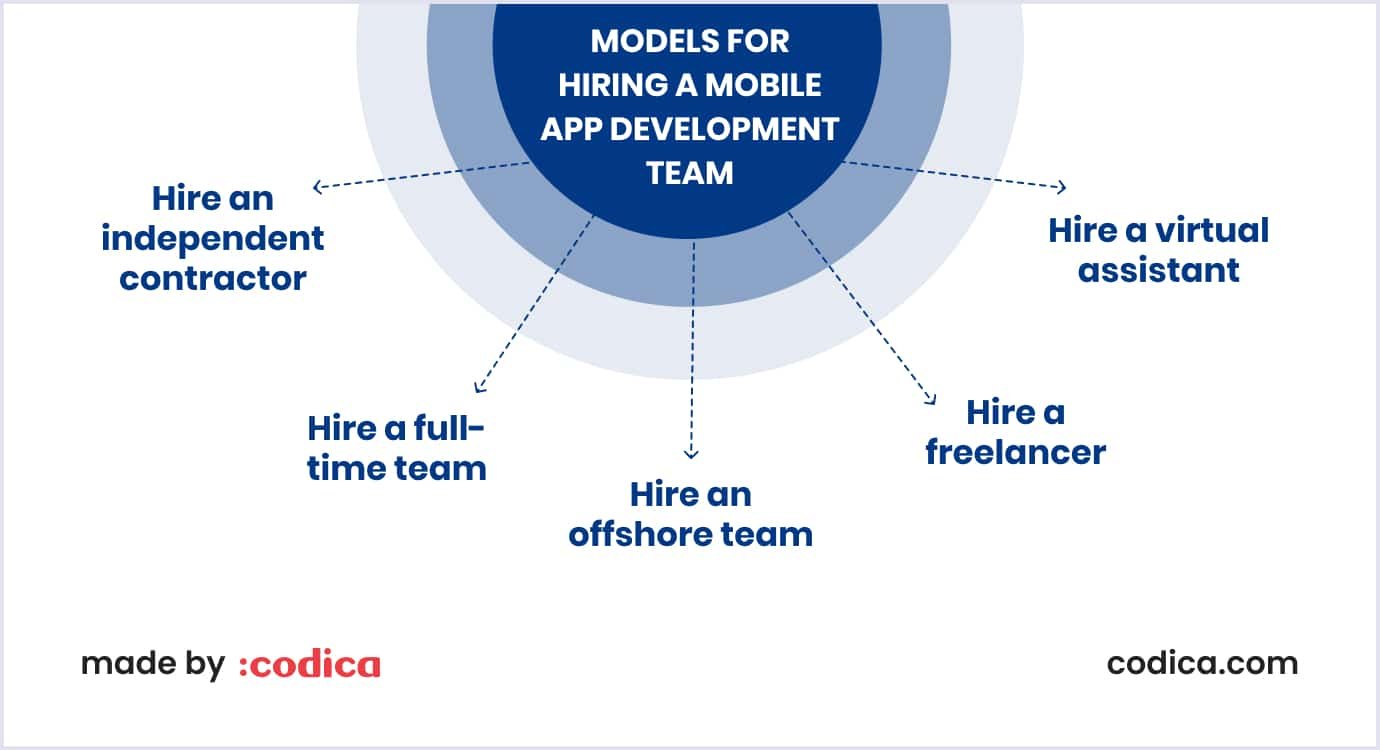
Model 1: Hire an independent contractor
Choosing this model means that a person or business entity will provide app development services for you. It can be for a particular project or long-term cooperation. They work on their own and are not your employees. So you pay only for their services.
Model 2: Hire a full-time team
This model suits you if you need committed professionals who work on app development at all stages. It means that you recruit specialists who work only on your projects. Thus, you can oversee and correct the app development process as needed. The drawback is the high cost of this model.
Model 3: Hire an offshore team
With this option, you can choose from a global pool of app development teams. You can also find qualified specialists at a lower price than local professionals. However, controlling the quality and timing of the delivered work is challenging.
Model 4: Hire a freelancer
By choosing a freelancer, you get flexibility in contractual relationships. Freelancers provide services for a project, typically at a lower cost than independent contractors or full-time employees. Consider, though, that finding a reliable freelancer takes time and effort.
Model 5: Hire a virtual assistant
This type implies hiring a specialist who works remotely from any location. Virtual assistants often provide their services on a contract basis. If you do not depend on time zones, this option fits you thanks to its flexibility and the fact that you have hired virtual assistants. The model may not be suitable for complex projects.
Platforms to find mobile application development experts
When looking for a reliable and experienced specialist, you should pay attention to specific platforms. A good choice in this case is Clutch, AppFutura, Upwork, Behance, and Dribbble. You can check the professionals’ and companies’ ratings, reviews, expertise, portfolios, and pricing.
When choosing specialists for your mobile app project, pay attention to the following points:
- Expertise. Choose specialists who have the qualifications and experience necessary for your project. Make sure that candidates apply up-to-date technologies and best practices in their work.
- Ratings and reviews. Consider the feedback that previous clients gave to a professional. Positive reviews are a starting point for establishing business relationships.
- Accessibility. Check that you can easily communicate with professionals and do not have trouble with time zones and language barriers.
- The team’s responding to queries. Consider whether you are comfortable with the team. You can check how the team responds to your questions and which communication channels they use.
Best approaches for building and managing a mobile app development team
When you build and manage your app development team, following best practices will make your team’s work more efficient. Let’s see how you can improve the management process to achieve the best results.
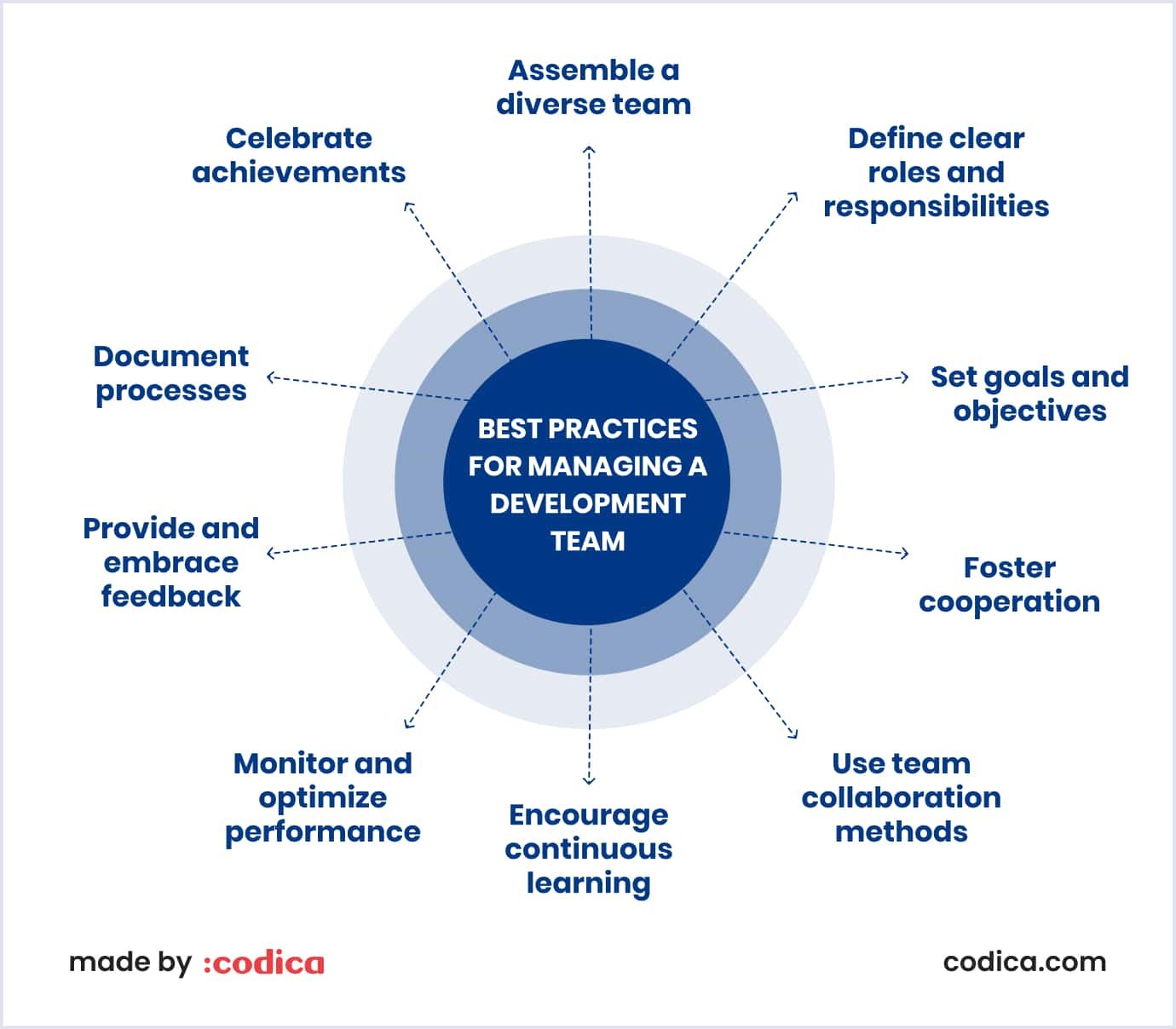
- Build a diverse team. Specialists with different skills will cover all aspects of mobile app development.
- Define clear roles and responsibilities. Show the software development team how they contribute to the development of the project.
- Set goals and objectives. You can outline them in a project roadmap that specifies tasks and milestones.
- Foster collaboration. Use project management tools to facilitate communication and document discussions.
- Use effective team collaboration methods. Depending on the nature of the project, you can choose between waterfall and agile approaches.
- Encourage continuous learning. Provide learning resources to your team so they can use the latest technologies in application development.
- Monitor and optimize performance. Use analytics tools to identify areas for improvement in app development.
- Provide and embrace feedback. Team members and you can share feedback and make necessary changes and improvements.
- Document processes. Document code, designs, and development processes for easy knowledge sharing and future maintenance.
- Celebrate achievements. Recognizing the team's achievements boosts morale and motivation.
You may also like: Top 11 Effective Partner Engagement Strategies for Business Owners
Cost of hiring a mobile app development team
Several factors influence the cost of hiring a development team for an app startup, and they are as follows:
- Project scope involving the app’s complexity and chosen platform or cross-platform development;
- Experience: junior specialists charge less than middle or senior;
- Cooperation model implying certain contractual relationships;
- Employment type, like full-time, part-time, or per-project basis;
- Location that influences professionals’ rates and salaries;
- Support and maintenance expenses to keep your app working;
- Marketing expenses to promote your app.
It is challenging to predict the cost of hiring an app development team, considering the diversity of mobile apps. But we will give you an example. An app requiring 1.5-3 months of work will take approximately 1000-1512 hours. So, the estimated cost of the team’s work will amount to $50,000-$75,000 at a $50 hourly rate.
Below is a table showing the breakdown of the mobile development processes and costs for each.
| Estimated cost to build a complex app | ||
| Features | Time, hours | Cost, $50/hour |
| Design | ||
| UX development | 84 hours | $4,200 |
| UI development | 112 hours | $5,600 |
| Architecture | ||
| Project setup | 48 hours | $2,400 |
| DB structure | 32 hours | $1,600 |
| Integrations | ||
| Payment (Stripe or PayPal) | 80 hours | $4,000 |
| Main functionality | ||
| Authorization and security | 72 hours | $3,600 |
| User profiles | 64 hours | $3,200 |
| Account settings | 64 hours | $3,200 |
| Main app page | 84 hours | $4,200 |
| Video and audio calls | 120 hours | $6,000 |
| Location sharing | 64 hours | $3,200 |
| Uploading pictures and videos | 64 hours | $3,200 |
| Embedded messenger | 120 hours | $6,000 |
| Adding friends | 40 hours | $2,000 |
| Push notifications | 40 hours | $2,000 |
| Non-development activity | ||
| Project management | 120 hours | $6,000 |
| Quality assurance | 192 hours | $9,600 |
| Code review | 48 hours | $2,400 |
| Publication of app | 64 hours | $3,200 |
| Total | 1512 hours | $75,600 |
When you agree on your case's scope, time, and budget, you will know the exact cost of hiring an app development team.
Read also: Mobile App Development Cost in 2025: All You Need to Know
Codica team’s experience working on mobile app projects
Our custom software development company is eager to help if you want to develop a mobile app. Our mobile development team includes the following specialists:
- Project manager;
- UI/UX designer;
- iOS/Android/cross-platform developer (depending on the project requirements);
- Backend developer;
- Quality assurance engineer;
- DevOps engineer.
This is the primary development team structure. It varies depending on the project scope, requirements, and planned budget. In every case, our skilled and experienced professionals do their best to optimize development and deliver an app under the latest programming and design standards.
So far, our team has delivered numerous projects with mobile-first design in mind. For example, we specialize in PWA development services and have created several progressive web application projects. This type of mobile app runs on the web and does not require a separate install. At the same time, it delivers a native-like experience.
One such project is the Wowner job match system, which helps find candidates for open jobs. The system analyzes candidates’ skills and preferences and matches specialists with current open positions. Our team on this project embraced the following specialists:
- 1 project manager;
- 1 UI/UX designer;
- 2 frontend developers;
- 1 backend developer;
- 1 QA engineer;
- 1 DevOps engineer.
The project was finished within the set timeline and budget with these professionals on board. The Wowner app comprises helpful features like analyzing skills, experience, remote or office work preferences, and desired hourly rates. If the candidate needs to gain skills, the system offers relevant courses. The app also presents local websites showing vacancies.
Check out the video below to see how the solution works on mobile devices.
We also invite you to review our portfolio for more mobile development projects we have delivered.
Takeaways
Mobile app development is versatile and embraces important details at each step. The team working on the app ensures its proper running and a delightful experience for users.
Now, you know who takes part in the process, how you can cooperate with the team, and how much it costs to hire them. With a skilled and collaborative team, you will get an app your customers will enjoy.
If you still have questions about team building and structure, we will gladly answer them. Contact us for a free consultation on your project, including the mobile app development team structure.
